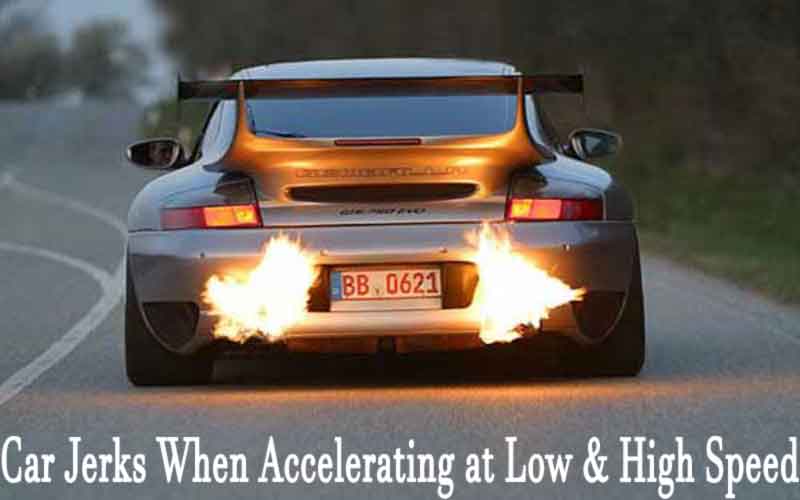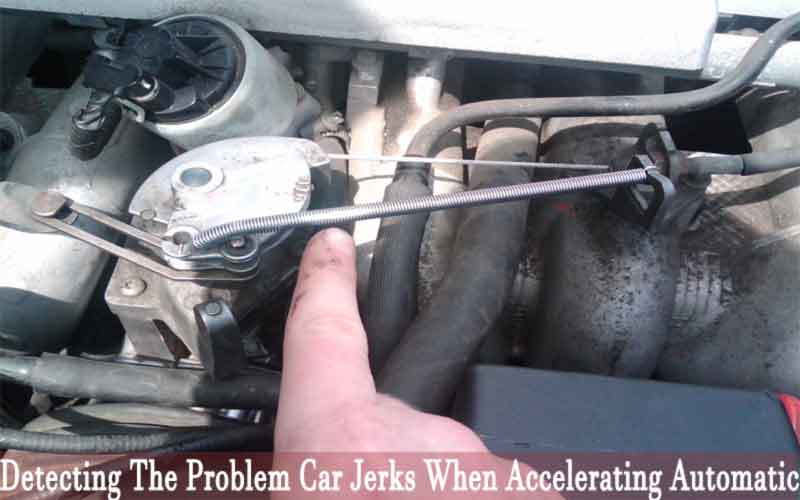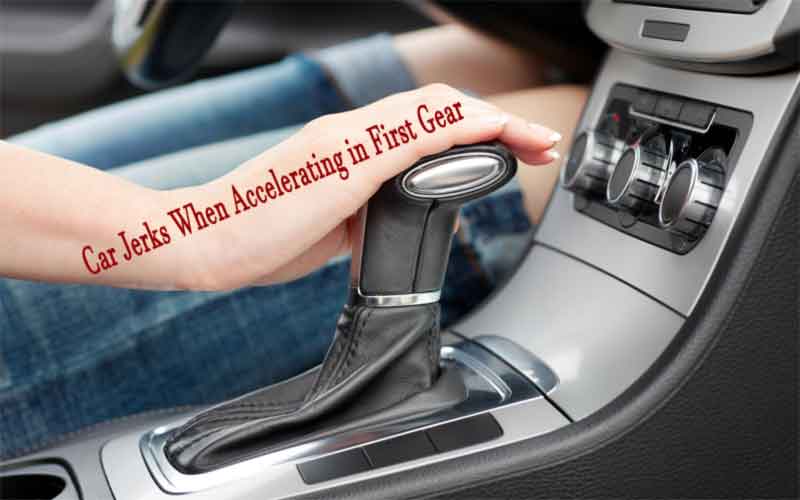Car Jerks When Accelerating – Common Causes & Solutions
Maintaining a car is not that easy. You will need to face a lot of problems while maintaining a car. It is not only a matter of luck regarding facing these problems but also skills and dedication towards maintaining your vehicle. This article mainly will focus on car jerks while accelerating. It is very unfortunate that your trusted car has started showing signs of jerking while accelerating.
But if you are thinking that this problem is not that critical then you are only delaying because you should take proper steps as quickly possible to avoid the problem to get any bigger.
This article will mainly highlight car jerks when accelerating at low speed and also jerking when accelerating from stop. The causes, reasons for these problems and also the ways to fix them should be highlighted.
Car Jerks When Accelerating at Low & High Speed
These words “Jerk, shake, lurch, jump and skip” are pretty common with your car jerking while accelerating from stop. These words suggest that maybe there’s something wrong with the transmission system, ignition system or electrical system, the fuel or lastly the air- induction system.

Car jerking while accelerating from stop mainly suggests:
- Ignition parts could be worn out
- There maybe some fault regarding the air or the fuel mixture
- Engine cylinders could be damaged
- Moisture in Distribution Cap
- Clutch got used in bad or improper way
- Fuel injector got dirty
- Acceleration cable has some defect
- Transmission fluid running low
- Clutch getting slipped because of defective transmission system
- Converter got clogged catalytic
These points should be highlighted while you will be looking for the origin of this problem. Keeping all these stuff in mind will help you to pick the reason and origin of the problem pretty easily.
Origin of the problem when Car jerking while accelerating
You should know that there are basically four junctions or points of origin of this problem. These points are the transmission system, the ignition system, the fuel system and the air induction system.
The Transmission System: The basic duty of transmission is to supply output from the power source and that is the Internal combustion engine to the wheels the drives the car. The parts that make a transmission system are gearbox, tires, clutches, universal joints, propeller shafts, rear axle, etc.
Basically there are two common types of transmission systems that are mainly seen in our everyday life vehicles. They are Hydraulic and Mechanical.
The works that a transmission system serves :
- The smooth connection and the disconnection of the engine with the power train
- The transfer of power in the reverse direction
- .Managing power transmission at different angles and sides
- Managing the wheels and giving the way of driving it different speeds of necessity
- Absorbing certain effects like torque reaction, braking effect and driving thurst
These services that are provided by the transmission system has a lot to do with the shaking or jerking. If the transmission system is incapable of providing any of the services then you can say that the car may face jerking or shaking while accelerating.
The Ignition System:
This system basically works as to generate spark that will make the combustion of air and fuel happen in the cylinder. This means the spark must generate a level of power to which has a high voltage that should jump the spark plug gap. It definitely should arrive inside of the cylinder making near-perfect timing in the stroke of the piston.
But the ignition system has to change with the change of speed because with speed the amount of time that it takes to burn the fuel in the cylinder is relative. The ignition has very important part to play in providing the power of the car and a weak spark will lead to a weak combustion and lack of power.
Timing issues have a lot to do with the ignition. This may end up causing pre-ignition or late-ignition. All these are reasonable causes are probably responsible for car jumping while driving.
The Fuel System:
The fuel system is very simple and straightforward which has a fuel tank, a fuel pump , fuel injector, fuel filter, etc. The primary and main task of fuel is to store and supply fuel to the engine of your vehicle.
When you start your engine the fuel gets transferred to your engine from the fuel tank through the lines and filters through the filter and goes to the injector. As a result, if anything happens that hampers the flow of the fuel then jerking is pretty normal while accelerating.
The Air Induction System:
This system is one of the most effectively important and visible systems of the vehicle. To be honest your car engine breathes through this system. It also mixes the fuel with air. Basically fuel efficiency or inefficacy, reliability, as well as drivable capability has everything to do with the air induction system.
The air induction system mainly has the duty to deliver two of the main needs of the vehicle and that is air and fuel to the engine. And while delivering the system should have the notice that the fuel should in proportional to the air.
If the induction system reduces the amount of air by restricting it then it will definitely effect on the fuel by also reducing the amount of fuel while mixing and this will end up decreasing the production of power.
The same thing happens if the induction system fails to provide a sufficient amount of fuel then the same thing repeats in vice versa. This again decreases the production of power in the engine. And this reduction of power ends up causing all the jerking while accelerating.
Detecting the problem car jerks when accelerating automatic
There are basically two simple and very basic way to exactly point out the origin of the problem. These two ways are beneficial for to detecting problems of jerking while accelerating. The ways are: “System inspection” and “OBD II scan tools”.

System Inspections
To diagnose or to pinpoint the problem in your vehicle the very simple and unique way is to visually inspect all the four systems of your car. This way of detection is very useful and handy but make sure that you are sure about the problem because without being sure this way of detection can a bit time wasting.
Using OBD II Scan Tools
The OBD II Scan Tool will help in a very versatile way. Not only the tool will help you to find out the simple problems but also it will also point out the critical and more complicated ones. As a result you have extra hand of expert in detecting the problems.
This scanning tool to gives you some specific and important engine operating data and through this data you can cover all the four systems in your inspection. As a result you can know which of the functions may cause problem and which are okay.
To be honest this scanner is very very advanced in its ways of detection. As a result, you can easily find out the problems that don’t even trigger the engine light of checking. For example, you can easily find out if there is anything wrong with the transmission fluid temperature. This is why this tool is very effective for detecting the problem.
Some Specific Causes of Jerking and Their Solution
By using certain tools and ways you can detect the problems in the four systems that is causing your car to jerk while accelerating from stop. But only finding the problems will not help there is also a part called fixing them. Now we will be talking about some specific problems and how to fix them.
1. Air Filter Getting Clogged:
If dirt or dust gets inside of your car’s air filter then clogged air filter is the result. But the good news is that this happens very rarely. And a clogged air filter causes jerking.
How to Solve:
If you don’t want the maintenance costs to be thrown at you then the best, simplest and cheapest option is to replace the air filter.
2. Fuel Injector Getting Clogged:
The main work of fuel injectors is to spray fuel in the cars intake system. And with time the injector gets clogged because of dirt getting stuck inside it. If the fuel injector gets clogged then jerking is very common for the car because then the fuel injectors fuel supply will get restricted.
How to Solve:
You should not straight way think of changing the fuel injector rather you should clean it. There are a lot of fuel injector cleaners in the market. You should buy one of them and inject in the car.
3. Catalytic Converter Getting Clogged:
This feature is not very common regarding as a cause jerking but still can cause you car to jerk while accelerating.
How to Solve:
This is very rare that a clogged catalytic converter can cause jerking while accelerating but still it is not impossible but this problem is very are and you will need a OBD II scanning tool to detect the problem and if there is any then you need to replace the coverter. It will be bit costly but yet it will be a wise decision.
4.Low Transmission Fluid:
Transmission fluid plays a very vital role regarding the transmission system. It helps to supply power in the cars engine and does the work cooling and lubrication in the transmission system. As a result, if the transmission is low then your car definitely will jerk while accelerating.
How to Solve:
The very first thing you need to do is to check the fluid. And before you doing that make sure that your car is on a level surface.
If there is any dipstick in your transmission system then clear all the dirt from the disk and the handle. After that check the level of the fluid using the dipstick and it gives reading that the fluid is low then check for any leakings and if there is none then fill the system reaching the correct level by using the dipstick.
Car jerks when accelerating in first gear
We have talked about the problem regarding car jerking while from stop now we will be talking about car jerks when accelerating at a very low speed. Yes, this is for you if your car is normal in the high speed but it starts to jer when you are in a very low speed.

The basic reason of this problem the misfire of the engine while the engine is in very low speed. This cause of the problem can be identical to some mentioned before but the very common cause this kind of problem is more of an environmental.
If any amount of moisture develops in the distributor cap then this kind of problem arrives. If you end up parking your car outside and the temperature changes drastically and becomes colder than before then your cars engine will form condensation and your distributor cap with moisture inside will cause a misfire in the engine leading to jerking while accelerating at low speed.
There is another problem that may cause this problem and that is regarding the engine mounts, an engine mount does the work of holding the engine in chassis and if the engine of your car is broken or loose then it is sure that it will your make your jerk while accelerating at a low speed.
Fixing the Problem car jerks when accelerating in first gear
Parking your vehicle outside while there is sunlight or in the garage will help prevent moisture from forming in the engine. And this will automatically reduce jerking to zero. And secondly, if there is no other way for you but to park your car ouside in night then you should cover with a thermal car cover. This will help your car by insulating.
And regarding the problem of engine mounts then you need contact a mechanic because more or less if the mounts is broken then you will definitely have to replace it for solving this problem of jerking.
Wrap Up
You have to keep in mind that if your car jerks while accelerating it is not a good sign. If this happens you definitely should go to a mechanic for fixing the problem. This article mainly focuses on this jerking problem and its ins and outs.

